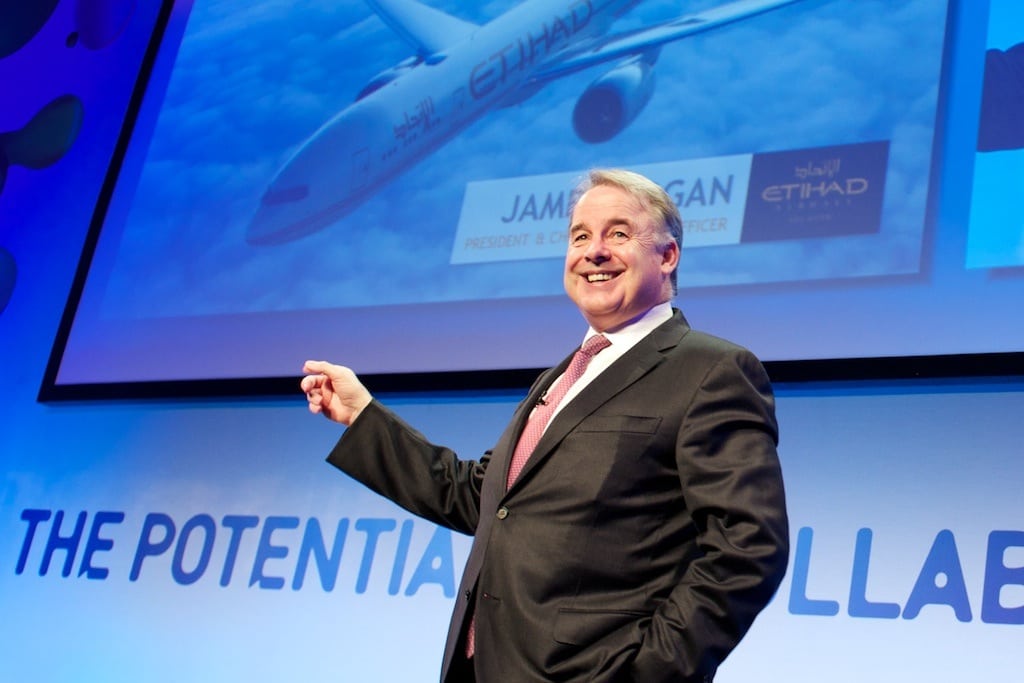Skift Take
Etihad's aggressive strategy to take equity stakes in five other airlines, and to take advantage of the resulting economies of scale makes a lot of dollars and sense.
Etihad Airways CEO James Hogan never mentioned Emirates or Qatar Airways by name, but he spoke about how he believes Etihad’s business model and strategy provide a benefit in its battle with the airline’s “two nearest competitors.”
Speaking at SITA’s 2013 Air Transport IT Summit today outside Brussels, Hogan noted that people representing 138 nationalities work for the airline, that it has 45 codeshares, eschews the big three airline alliances (as does Emirates), and can fly passengers to some 475 destinations, “more than my nearest competitors.”
But, the largest differentiation may be in Etihad’s investment and collaboration strategy as it has taken equity stakes in four other airlines, including airberlin (29%), Air Seychelles (40%), Aer Lingus (nearly 3%), and Virgin Australia (10%), while a deal to take a 24% stake in India’s Jet Airways is pending regulatory approval.
The partnership with Jet Airways, if approved, will “take me to secondary cities [in India] that I will never serve,” Hogan said.
“Scale is what it’s all about,” he added.
Hogan explained how Etihad started from “a blank piece of paper” in 2003, and therefore doesn’t have the constrictions of a legacy carrier. And, as a full-service airline, Etihad has achieved scale, through its myriad airline partnerships and investments, “faster than any airline,” Hogan said.
Etihad’s mandate, Hogan said, is “to make money” and to be the “best,” and not just the biggest airline.
Hogan said Etihad’s investments in airberlin, Air Seychelles, Aer Lingus, and Virgin Australia enable the airlines — which have more than 500 aircraft together — to collaborate as they strive to “not duplicate the overhead.”
In fact, Etihad is hiring and retraining displaced airberlin pilots. When Etihad announced that decision, Hogan spelled out the strategy: “This development is part of the broader process to strengthen our alliance with equity group partners. With airberlin we are already sharing resources, integrating our fleet programs, aligning our well-experienced personnel, and developing careers.”
Although he doesn’t articulate it this way, Hogan views Etihad as a sort of flying hotel from the perspective of passengers, who the airline refers to as “guests,” not customers.
Etihad indeed benchmarks the way it treats passengers against the world’s best hotels and restaurants, Hogan said.
Hogan argued that airlines have to treat passengers well throughout the travel experience, including the baggage retrieval and transfer process, for example.
“We may get it right on board, but it’s no good getting it right on board if we get it wrong on the ground,” Hogan said.
Hogan noted that emerging technologies will be vital in attracting and retaining passengers, and he vowed that Etihad will have Wi-Fi connectivity throughout its fleet by August 2014.
Like other airlines, Hogan said developing ancillary revenue is vital, “but it doesn’t mean selling toilets on the aircraft.”
Etihad, for example, enables passengers to bid online for business and first-class upgrades, which are also offered “in the last couple of hours” before the flight at the airport. Selling travel insurance, exit-row seating, and extra legroom in couch should also be part of the mix, Hogan said.
These things are part of the evolution of the aviation industry, which Hogan contended is “at the forefront of change.”
“We are not going anywhere, this industry,” Hogan said. “Where we are going is we’re changing.”
Hogan obviously hopes that Etihad can change and manage to grow faster and more profitably than its “two nearest competitors.”
In the case of Emirates, at least, that will be a tall order.
The Daily Newsletter
Our daily coverage of the global travel industry. Written by editors and analysts from across Skift’s brands.
Have a confidential tip for Skift? Get in touch
Tags: emirates air, etihad
Photo credit: James Hogan, Etihad's CEO, at the SITA 2013 Air Transport IT Summit near Brussels June 20, pointing to the airline's strategy as a key differentiator from its airline rivals. SITA Online
